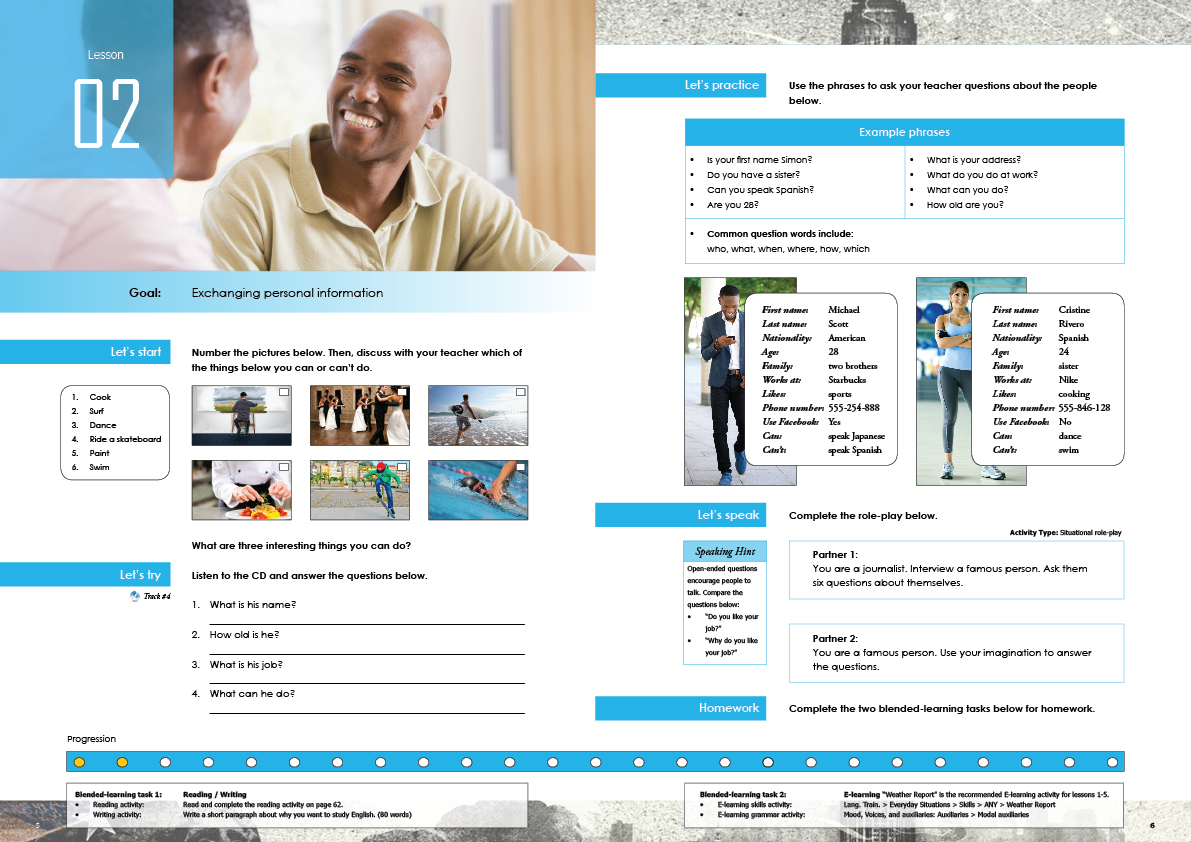
Manuals > General English > Rosetta Stone Advantage > Elementary - Book 2 > Lesson 2
< Previous Lesson | Next Lesson >

By the end of the lesson, the student should be able to ask for and exchange information.
Communication strategies:
The student should be able to ask someone for information using the following strategy:
1) Greet your partner
2) Introduce yourself
3) Ask for personal information
4) Comment
e.g.
A)
I'm Ben. Nice to meet you.
B) Hi Ben. I'm Stacy.
A) Nice to meet you.
B) Nice to meet you too.
A) So, Stacy, where are you from?
B) I'm from China.
A) Cool. I went to China last year.
Words and rules:
- The student should be able to use the present simple tense to state facts or habits.
- The student should be able to express ability.
- The student should be able to ask open and closed questions about:
someone's name
someone's nationality
someone's age
someone's family
someone's job
someone's company
someone's phone number
whether someone uses SNS or not (e.g. Are you on Facebook?”
whether someone can do something or not
Appropriateness:
Non-verbal behaviour: You could teach the student how to exchange a business card, if the situation comes up.
Register: When meeting a new person outside business situations a casual register is used.
Social rules: We usually don't say our age or ask for someone's age when introducing ourselves. Offering some private information about ourselves e.g. our hobby or where we are from is a good way to develop trust and make friends.
Cultural references: "What is your?" can be pronounced "Whatcha?"
Track #4
Hello my name is Sam. I’m 24. I live in New York. I’m a student. I love
studying languages. I can speak English, Spanish and French. Also, I
can speak a little Chinese, but I can’t read or write it.
Because the lesson touches on the topic of skills, you are welcome to introduce some of the following vocabulary if you like.
1) How well do you [snowboard]? (exp)
2) How about [skiing]? (exp)
3) be good at something (adj phrase)
4) be bad at something (adj phrase)
5) be terrible at something (adj phrase)
6) be OK at something (adj phrase)
7) be not very good at something (adj phrase)
8) be able to do something (adj phrase)
9) be unable to do something (adj phrase)
10) know how to do something (v phrase)
Option 1:
Difficulty ★★
Type:
Let's start - Warm-up discussion
Purpose: Steering the student into the goal of the lesson before opening the book.
Method:
Before you open the book, take turns talking about things you can do really well. You can start with a model.
e.g. I am really good at dancing. I can do ballet and ballroom dancing. How about you?
Option 2:
Difficulty ★
Type:
Let's start - Warm-up discussion
Purpose:
Steering the student into the goal of the lesson before opening the book.
Method:
Before you open the book, discuss what information you usually want to know when you meet someone for the first time. e.g. their name / whether or not they use LINE or Facebook etc
Option 3:
Difficulty ★★
Type:
Let's practice - Controlled practice - sentence transformation
Purpose:
Practicing creating WH and YN questions
Method: Give the student an answer and have them work out what the question was
e.g. I am Dave. = What is your name?
Yes, I am Australian. = Are you Australian?
Note: We usually answer YN questions with either “yes” or “no”.
Extra questions you might like to ask in the lesson
- Are you on Facebook?
- Do you have a big family or a small family?
- Where did you grow up?
- Whereabouts in Tokyo?
A speaking hint you might like to use
AAA (Answer > Add > Ask)
> Feel free to use this speaking hint in the “Let’s Practice” / “Let’s Speak” sections of the lesson
e.g. Can you speak Spanish?
ANSWER: Yes, I can.
ADD:
I started studying it when I was in year 10, but I don’t use it that much.
ASK: How about you? How’s your Spanish?
Let’s try
1) What is his name?
His name is Sam.
2) How old is he?
He is 24.
3) What is his job?
He is a student.
4) What can he do?
He can speak English, Spanish and French. Also, he can speak a little Chinese, but he can’t read or write it.
Let’s practice
Content
First name: Michael
Last name: Scott
Nationality: American
Age: 28
Family: two brothers
Works at: Starbucks
Likes: sports
Phone number: 555-254-888
Use Facebook: Yes
Can: speak Japanese
Can’t: speak Spanish
Expected outcome
Y/N Questions
Is his first name Michael? / last name Scott? / phone number 555-254-888?
Is he 28 / American?
Does he use Facebook? / like sports? / have two brothers? / work at Starbucks?
Can he speak Japanese? / Spanish
W/H Questions
What is his first name? / last name / phone number? / nationality
How old is he?
How many brothers does he have?
Where does he work?
What languages can he speak?
Let’s speak
Interviewing a famous person
A) Hello Mr. Schwarzenegger. Thank you for your time today. I’d like to ask you some questions.
B) Sure.
A) First, where are you from?
B) I’m from Austria
A) And, how old are you?
B) I am 68.
A) What languages can you speak?
B) I can speak English and Austrian.
A) What do you do?
B) I’m an actor.
A) What is your favorite movie?
B) Terminator 2.
A) Do you have any children?
B) I have three sons and two daughters
A) Thank you very much for your time today.